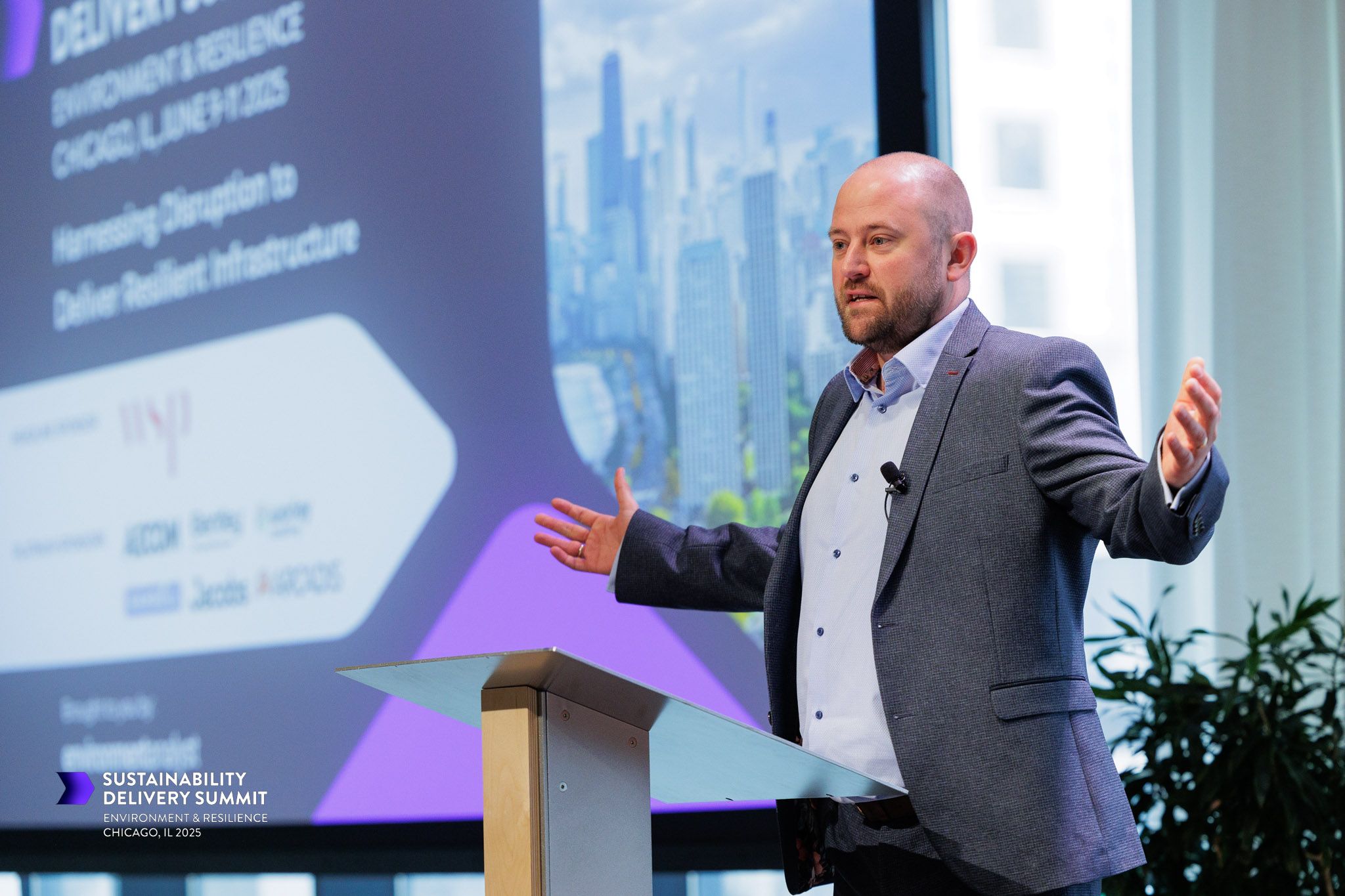Harness your passion to keep business transformation on course
)
On the 10 June, I had the honour, and trepidation, of opening our Sustainability Delivery Summit in Chicago.

Trepidation because I knew that what I was about to say was risky, honest and unfiltered in a country where free speech is under attack like never before.
But it is needed. As a sector we need to be honest about what is happening in the US right now.
There are risks in speaking out. But the current administration’s actions pose a far greater threat, by slowing and reversing the transition to business resilience, which has been gaining momentum in the last couple of years.
Below you will see my opening remarks exactly as I spoke them. By publishing them as a thought leadership piece, Environment Analyst hopes it will stimulate further conversations, ones that are honest and reflective of the moment we are in.
Reversal and sleepless nights
My role in these opening remarks is not an easy one. The Summit comes at a difficult time for infrastructure delivery, climate science, sustainability and environmental compliance around the world.
At the half way stage to 2030, it feels like we are stepping backwards not forwards.
Governments and nations are becoming insular, their negotiations transactional.
We seem to be willfully ignoring an evolutionary trait that makes us unique: human foresight – the ability to anticipate future events and plan accordingly.
I know many of you have suffered over the last six months. Anxious times, sleepless nights.
- How do I respond to that stop order?
- How do I manage my cash flow crisis?
- How do I protect my federal contracts?
- Should I change my job title?
- Have I removed every last mention of ED&I from my website?
I have spent a lot of my time over the last few months speaking to business leaders in the environmental solutions space.
I have seen the doubt in your eyes as you sometimes optimistically tell stakeholders, colleagues and friends that it's OK, the sector will be OK.
But it's difficult to watch decades of work, of incremental policy improvements coming under threat like never before.
Some changes include:
- US AID, founded in 1961 by president Kennedy, with 10,000 employees in 2023 – obliterated.
- FEMA, founded by Jimmy Carter in 1979 to help states or local authorities overwhelmed by natural disasters, has lost a quarter of its staff and its head removed for protesting against its potential abolition.
- The National Oceanic and Atmospheric Administration’s (NOAA) Climate Program Office will no longer track the cost of climate crisis-fuelled weather disasters, including floods, heatwaves and wildfires. Its portal climate.gov to be phased out.
- The Council on Environmental Quality (CEQ) issued a rule which rescinds its NEPA implementing regulation, enacted in 1970, effectively passing NEPA rulemaking and scope to federal departments.
- The Justice40 Initiative – scrapped. Environmental justice not supported at the federal level.
- The SEC has refrained from defending its mandatory ESG reporting rules from legal challenge.
I have admired how you remained positive throughout and stuck to the task that has defined you for most of your working lives, regardless of decade, seniority or company: helping your clients and colleagues to be as environmentally risk-averse and sustainable as possible.
I want to dwell on this for a moment, because it's important. Most of you here are deeply united by this, and it's easy to forget it.
Your talent of the possible
You share a passion, all of you, for:
- Regenerating impoverished neighbourhoods
- Safeguarding communities from the impacts of extreme weather
- Providing a reliable source of energy
- Protecting the environment for communities
- Helping your stakeholders safeguard against future litigation
- Reducing operating expenditure through efficient design
- Designing infrastructure that communities are proud of
- Cleaning up contaminated sites
- Connecting communities
Your passion and that of your staff remains unchanged. But the mechanisms determining how you harness it and the language you can use have altered. The landscape has shifted, not just here in the US but around the world.
In the last 15 years, you have had to navigate the global financial crash, the resources downturn, the CV-19 pandemic and now Trump 2.0. Combined with geopolitical uncertainty. This has put economies under strain like never before.
If history has taught us anything, it’s that when economies struggle, political and social priorities shift. It has also taught us that these challenges are never a short-term fix.
It needs long-term planning, and investment. Is sustainability and ESG a casualty of this?
Did we drive forward the environmental pillar supporting sustainable development faster than the economic and social pillars? Perhaps.
I have heard it said that sustainability is in a recession, perhaps it is. But I think something deeper is happening.
Sustainability for its own sake is over. The era of greenwashing is over. Real sustainability – where committed parties continue to embed sustainability into projects because it makes long-term business sense – is upon us.
These parties won’t shout about it, they will just do it.
We are seeing companies, organisations and institutions diverge between:
- those engaged in federal preservationist green hushing, to keep contracts; and
- those who feel liberated from their need to greenwash.
While money flows out of ESG investment funds, there is no doubt in my mind … investors will still want to protect their money.
ESG – or what it represents – is not going away. But it will retreat to its true purpose of due diligence and asset protection.
Asset managers and investors know what is needed.
They know investing in coal is untenable. They know investment in agribusiness requires an understanding of severe weather risks, like droughts and flooding. They know a new mine needs permits and environmental management plans in place to avoid reputational damage, even if departments or regulators say it's not required.
US, the world needs you
Much has been said about the United States and the new administration in bringing about our current moment. Make no mistake, the role, the influence this great nation can have on the world is astonishing.
Your heritage in environmental protection and sustainability runs very deep indeed. And when the US leads with compassion, collaborating with its partners around the world, others follow.
The world needs the US to combat climate change, and provide economic stability.
Your role now, as infrastructure, environmental and sustainability leaders has just become extremely important. It is possible for the US to get left behind again in terms of climate resiliency and green economic investment.
You need to harness your passion, developed over decades, to communicate the business case for developing infrastructure sustainably.
You need to answer the question: How do you make sustainable infrastructure projects normal for your clients, investors and users?
To wrap this up, I am going to draw on the inspiration of Dwight D Eisenhower in his farewell address to the nation in 1961.
"As we peer into society’s future, we – you and I, and our government – must avoid the impulse to live only for today, plundering, for our own ease and convenience, the precious resources of tomorrow.
"We cannot mortgage the material assets of our grandchildren, without risking the loss also of their political and spiritual heritage."
It has never been truer today, but this is 65 years ago!
Across this agenda, in this event, the topics have been specifically selected for the moment we, you, everyone in this industry finds itself in.
The topics are designed to force you to think about how you respond in this moment to unfamiliar territory.
I hope through the event we can help you nurture new ideas, develop lasting relationships, and come away energised and ready to harness that passion you all have to deliver the projects your children and grandchildren can enjoy in years to come.
Because that passion is needed more than ever.
If you would like to respond to this thought leadership piece or reproduce it, or discuss writing your own piece, please get in touch with our Editorial Director Emma Chynoweth at emma@environment-analyst.com.


